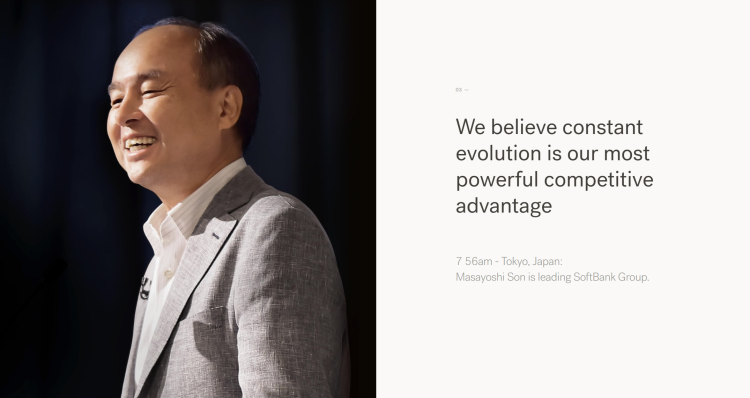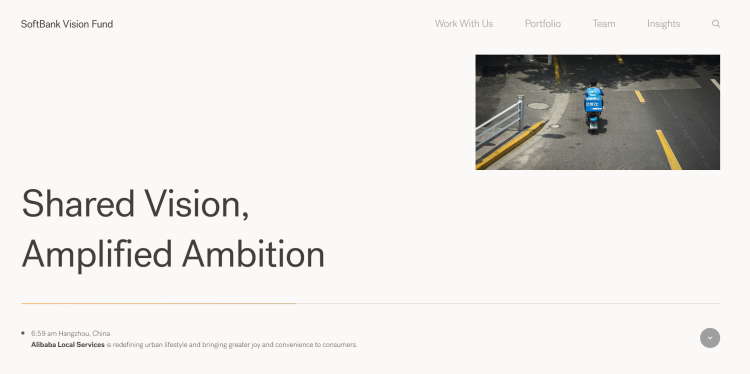Source: Future Technology Power
Author: Xue Liang Neil

Image source: Generated by Wujie AI
The image of Masayoshi Son is distorted in a way that leaves a deep impression, matching his approach. Son is not tall, with a mild appearance, looking like an ordinary Japanese old man (despite being of Korean descent). When speaking English, Son's speech is often slow, with a strong Japanese accent, almost like a beginner in English, completely unlike someone who studied economics and computer science at the University of California, Berkeley. Even when describing the grandest vision, Son is deliberate, with little emotional fluctuation, so much so that you could say he doesn't really enjoy the spotlight and the stage.
In fact, after announcing his intention to step back from his company SoftBank last year, Son truly disappeared for several months, just like any retired old man.
Everything is completely at odds with the term "leadership temperament." However, as the perennial richest man in Japan (and even briefly the richest man in the world), the funds at Son's disposal were once so vast that they could influence the global technology and venture capital markets. His gambler-like aggressive investment style has even been described as single-handedly creating global inflation in the primary market.
Of course, this was before the failure of the Vision Fund, and now we can see the successful listing of ARM in September as a turning point, meaning that Son can finally emerge from the shadow of failure and once again execute his wildly adventurous ALL IN strategy.
This may be his last gamble.

Screenshot of SoftBank Vision Fund official website
The Failed Philosophy of ALL IN
The stories that people love to talk about regarding Son include deciding to invest in Alibaba in five minutes, injecting $100 million into Yahoo when it only had 15 employees, and convincing a Saudi prince to invest $45 billion in the Vision Fund initiated by him in just 45 minutes—an average value of $10 billion per minute.
These stories are so romantic that they are almost chilling, because behind them are astronomical amounts of money that Son decided on in a very short time.
ALL IN, a term that has now been overused, was originally used to describe Son.
Unlike his mild appearance, Son is an intuitive investor who values the feeling of interacting with people in a very short time. When Son is in high spirits, this intuition is mythologized as a kind of golden finger, full of Eastern Zen and ineffable mystery, as well as the drama and passion that Westerners are fond of, which fits Son's identity: a third-generation Korean immigrant who does not fit into Japanese society, an Asian who received higher education in California and struck gold.
Based on this ALL IN philosophy, Son's career reached its peak in 2016. That year, he spent $32 billion to completely privatize ARM, an action that took only two weeks from finalization to completion. In order to gain 100% control smoothly, Son even made an offer to the ARM board that was impossible to refuse: the acquisition price was 43% higher than ARM's market value at the time.
The reason for doing this was simply because Son had a very brief conversation with the CEO of ARM (this conversation even took place at a party), and he believed that ARM's Reduced Instruction Set Computing (RISC) architecture's near-monopoly dominance in mobile chipsets would have tremendous growth potential in the future.
The following year, Son established the Vision Fund with a total value of nearly $100 billion, with investors including not only wealthy Saudis but also a number of technology companies including Apple. It continued to implement Son's ALL IN philosophy, attempting to replicate the success of Alibaba and Yahoo based on intuition. However, the development of everything eventually went in a direction that Son did not want to see.
ARM's revenue never improved, with its annual net profit being only one-sixtieth of the acquisition price. WeWork, expected to be the next Alibaba, fell like a shooting star, and Son's investment, decided in 28 minutes, ultimately went down the drain with his $12 billion. The financial condition of the Vision Fund and SoftBank Group deteriorated rapidly, with losses of 6 trillion yen within six months in 2022. The Vision Fund's losses amounted to several billion dollars, to the extent that in recent years SoftBank has almost relied on selling Alibaba shares to fill these holes—the most well-known and outstanding investment brought him a return of 3000 times.
The ALL IN strategy has systematically failed.

Screenshot of SoftBank Vision Fund official website
It turns out that Son's intuition is not always accurate. For example, when acquiring ARM, Son claimed that ARM's revenue would increase fivefold within five years, but the fact proved this prediction to be completely wrong, with ARM's revenue growth being only 65%, even lower than the overall market growth rate.
Son's confidence originally came from ARM's monopoly position, but ARM's monopoly position did not match its actual income. Its income mainly comes from licensing fees, but when ARM sought market share in the early days, it set the fees so low that it was unbelievable, with an average of only 9 cents per chip, compared to Qualcomm, which at one point charged up to $20 in patent fees for devices like the iPhone.
Another well-known failure is the social app IRL, in which the Vision Fund led a total investment of $170 million in this startup founded in 2019, but in reality, 95% of its 20 million monthly active users were bots.
There are many such examples, with most of the hundreds of companies Son invested in failing to meet expectations. However, unlike the typical Pareto principle, Son's ALL IN investment style, backed by massive funds, effectively amounted to betting on the entire market and applying huge leverage. Due to various bearish factors such as geopolitical issues, inflation, and sluggish demand, the ALL IN strategy ultimately completely failed.
From Son of God to Tokugawa Ieyasu
The ALL IN strategy brought a legendary halo to Son, but as it rapidly transformed into a comprehensive attack on Son's adventurous and reckless style, it has even given rise to a subculture in Japan aimed at attacking Son—a Korean-Japanese person's identity is traditionally subject to various forms of overt or covert discrimination in mainstream Japanese society, and Son's personal style sharply contrasts with conservative Japanese culture.
So why is Son so obsessed with the ALL IN strategy, regardless of everything?
Essentially, Son is a highly talented businessman. It is said that at the age of 16, after reading a best-selling book by McDonald's Japan President Fujita, he determined his direction of development. At that time, Son, still a poor boy, persistently made dozens of calls to Fujita for help, and Fujita eventually gave Son two pieces of advice that changed his life: to broaden his horizons in the United States and to study computer science.
Son did exactly that.
From this, we can see his character, on the one hand having absolute execution ability, and on the other hand, this unhesitating and discerning execution reflects an extreme, opportunistic, and pragmatic approach.
When Son first arrived in the United States, he thought every day about inventing ideas, which he saw as the fastest way to make money at the time. After thinking of more than 200 ideas, Son eventually patented one and sold it to Sharp for $1 million, earning his first bucket of gold in life.
Although this widely circulated story is certainly embellished, we can still see that Masayoshi Son's results-oriented approach has always been very clear: to make money. As for the process or whether it is a business he enjoys, Son seems to be less concerned about it.
This has led to Son's business empire, the SoftBank Group, being a hodgepodge, with almost no one able to clearly say what SoftBank's main business is. Son can acquire the telecommunications industry to secure the exclusive sales rights for the iPhone in Japan, and also invest in various high-tech technologies from the sharing economy to chip companies. The English name "SoftBank" originally represented Son's involvement in bulk software sales, which was a good business in the 1990s, but Son also started a computer magazine to expand his sales channels.
Making money is the top priority.
This opportunism is one of the reasons for the emergence of the ALL IN strategy, because it is obvious that the ALL IN strategy has the highest return on investment. Son, who tasted success in the gamble between Yahoo and Alibaba, could not help but adhere to this philosophy, like a true gambler.
Moreover, he has experienced going from being extremely wealthy to being penniless and then making a comeback. In 2000, when the internet bubble burst, SoftBank's market value plummeted by 99% from $200 billion, but even in this situation, Son did not give up.
The experience of successfully dealing with the internet bubble did not prompt Son to adjust his strategy in a timely manner when problems arose with the Vision Fund. Instead, after losing $10 billion, Son compared himself to the misunderstood Son of God, Jesus, during the earnings call. He firmly believed that the current difficulties would soon pass, in other words, the ALL IN strategy was worth persisting with.
However, the difficulties did not pass.
Despite Son's excellent strategic vision, unwavering belief, and the courage to take risks at critical moments, there are still many things that he cannot control, such as the pandemic, geopolitical changes, and inflation. With the Vision Fund's losses showing no signs of decreasing, Son finally had to face the failure.
Last summer, during an earnings call, Son showed a painting of Tokugawa Ieyasu to global analysts. The painting depicted the dire situation of Tokugawa Ieyasu after his defeat in the Battle of Mikatagahara in 1573. The fierce attack by Takeda Shingen frightened Tokugawa Ieyasu to the point of losing control of his bodily functions and even considering seppuku. It is said that this painting was ordered by Tokugawa Ieyasu himself, with the purpose of constantly reminding himself not to forget this painful lesson.
Son could relate to this, and while apologizing and reflecting on his recklessness to everyone, he used this painting to encourage himself and everyone else—Tokugawa Ieyasu successfully ruled all of Japan 25 years after his defeat at the Battle of Mikatagahara.
However, three months later, Son dramatically announced his retirement during another earnings call. He stated that SoftBank would shift to a so-called "defensive mode," and he would reduce his involvement in specific operations.
In other words, the gambler decided to retire. Many people felt that from that moment on, Son fell from grace.
But fate played another trick on everyone. Just in the same month that he announced the so-called defensive mode, chatGPT emerged.
The Final Gamble
In 2010, SoftBank released a PowerPoint presentation called "Vision for the Next 30 Years." In this somewhat rudimentary presentation, Son outlined his vision for the development of human society over the next 300 years. One core idea was that the information revolution would enhance people's happiness, achieved through the rapid growth of CPU performance—it would eventually surpass the human brain, and this type of computer is the product of the automatic combination of data and algorithms, namely artificial intelligence.
This thinking shaped the vision of the Vision Fund: to change the world through truly disruptive technologies for the future.
So you can see the Vision Fund as Son's gambling table, but in gambling, all in one side is all win, and the other side is all lose. In the end, Son had to fold.
However, the decision to withdraw from daily operations made by Son and the emergence of chatGPT seemed like a perfectly timed climax of a brilliant drama: on one hand, it was Son's vision that he struggled to give up, and on the other hand, it was the vision of artificial intelligence that finally saw the light after hard work. They complemented each other, forming a very sharp contrast.
So the gambler returned. After almost half a year of claiming that he would no longer speak at earnings calls, Son confidently stated that the defensive phase was over, and it was now time for a full-scale offensive, with the big model race represented by chatGPT being the unquestionable direction.
The familiar-looking Son beamed with confidence, saying that he uses chatGPT almost every day and has established close contact with Sam Altman, the CEO of OpenAI.
AI seems to be a good investment opportunity for Son, or you could also call it a gambling target.
After ARM's listing, the stock price soared by 25%, and the market value of around $65 billion helped Son raise nearly $5 billion. With the loans obtained from pledging SoftBank's ARM shares and the liquidity funds he originally had, Son had approximately $60 billion in investment capacity, enough for him to intervene in any AI arms race.
Coincidentally, the ALL IN strategy is even a very suitable investment strategy for the AI field, as training large models is an area that requires quick decision-making and massive budgets. Even having ARM is an advantage for Son, as with the gradual completion of large model training, the inference work will inevitably require the computing power of edge devices, and ARM holds a monopoly position in this field.
Rumors were already circulating on the first day of ARM's listing on September 15th. The Financial Times cited sources close to Son as saying that SoftBank is considering investing in key AI companies such as OpenAI or Graphcore. In a sense, this was Son's opportunity to correct his mistakes. In 2017, SoftBank had invested in Nvidia and was once its fourth-largest shareholder, but in 2019, Son sold off all of his Nvidia shares, and we all know what happened to Nvidia's development after that.
According to Son himself, his ideal was to retire at the age of 60, so SoftBank's entry into this can be seen as the last and biggest gamble for this madman and adventurer.
For AI, he went ALL IN.
免责声明:本文章仅代表作者个人观点,不代表本平台的立场和观点。本文章仅供信息分享,不构成对任何人的任何投资建议。用户与作者之间的任何争议,与本平台无关。如网页中刊载的文章或图片涉及侵权,请提供相关的权利证明和身份证明发送邮件到support@aicoin.com,本平台相关工作人员将会进行核查。




